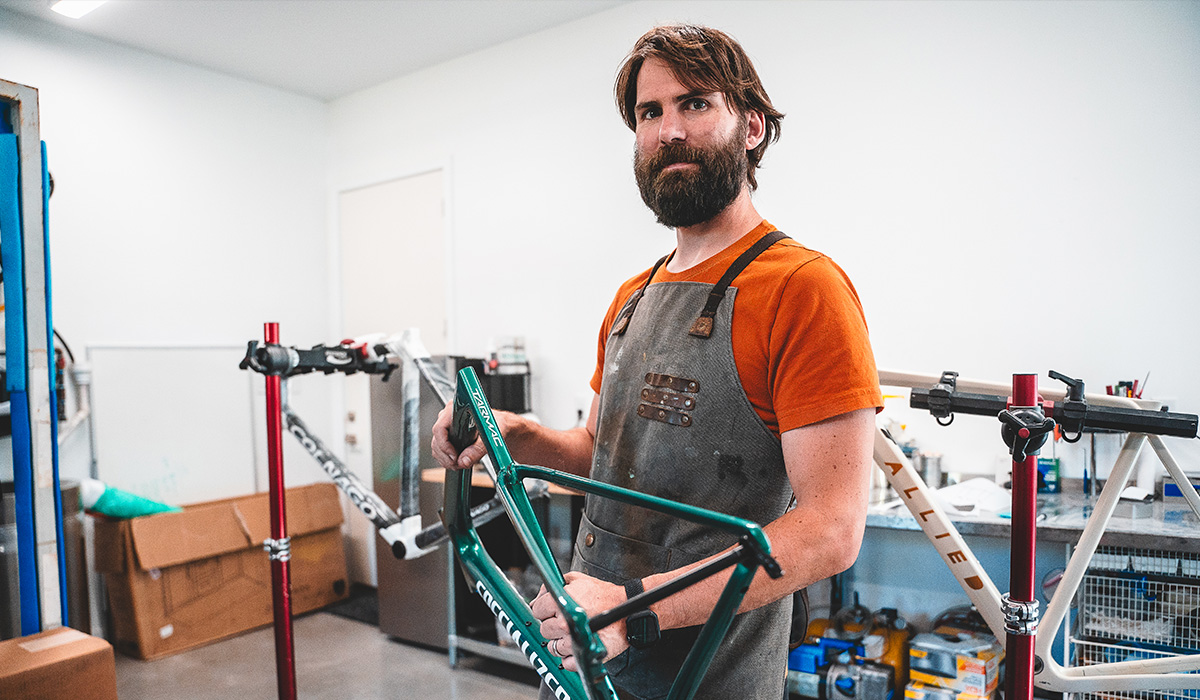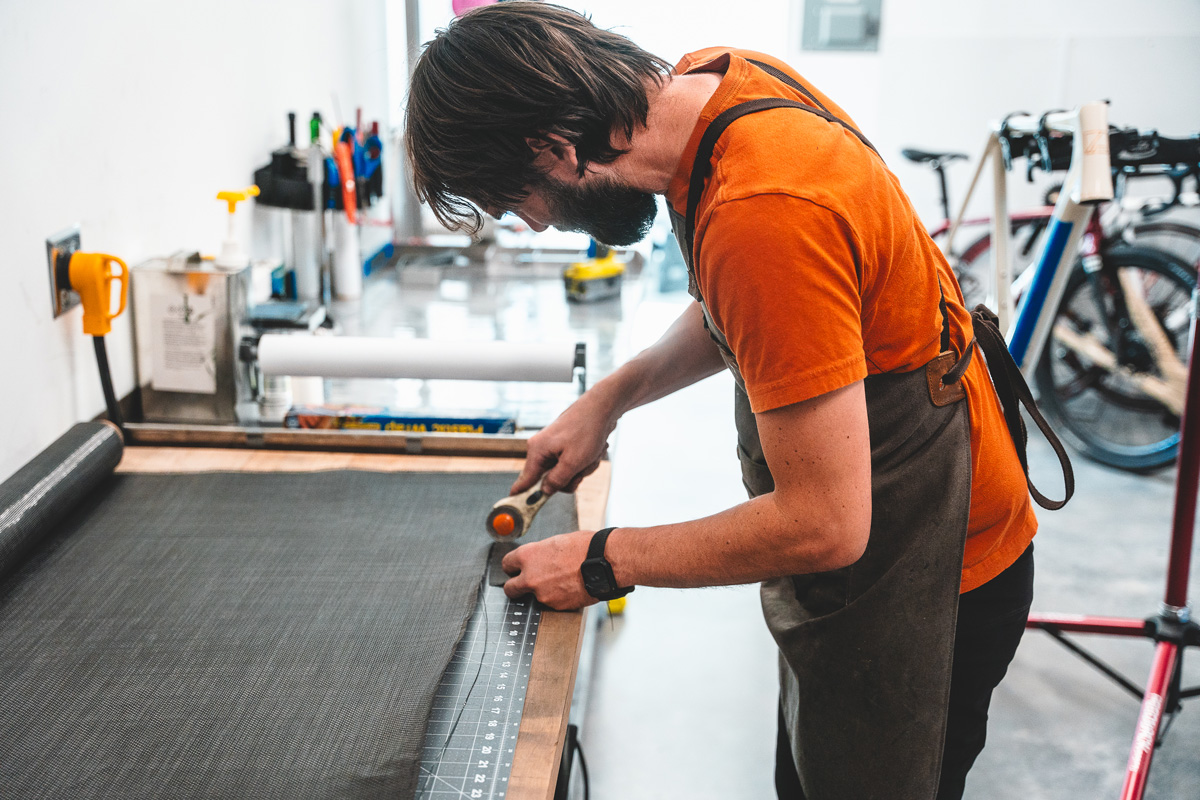Keeping Bikes
Rolling
Hex Carbon Workshop gives frames a new lease on life.
Story and Photography by Kai Caddy

MR. FIX IT: Webber with a broken frame in Hex Carbon Workshop’s new facility.
As carbon fiber bicycles became the hot new thing in 2007, Frank Webber — then an employee at Chainwheel in Little Rock — immediately saw an issue with the hot new material.
As soon as a customer had a problem with their frame, crack, chipped paint, whatever, manufacturers were replacing the frames in a heartbeat. That didn’t sit well with Webber, who now owns and operates Hex Carbon Workshop, a thriving carbon bicycle repair business with new digs in Little Rock’s SOMA neighborhood.
“I’m kind of a hippie,” Webber said. “I just hated that we were tossing all these bike frames. That was never a problem we had when aluminum and steel were the big frames. It was rare that you’d have manufacturer defects. When carbon first hit, warranty rates went through the roof.”
You don’t become a carbon repair guru overnight, but it was one particularly desirable frame that got Webber to dabble in the idea of giving broken bikes new life.
“It was a Cannondale Super Six,” he said. “I was walking it down the hallway to go toss it in the dumpster. And it was a bike I had really, really, really wanted and couldn’t afford. So I went to the sales rep and I was like, ‘Hey, man, can I keep this frame?’ And he was like, ‘Yeah, what are you gonna do with it?’ ‘I’m just gonna hang it on my wall and look at it. It’s super cool.’ He’s like, ‘OK, sure, whatever.’ And so I ordered an automotive ‘fix your carbon fiber hood’ kit from some online place and just kind of gave it a go. Obviously it was very different from the way we do things now, but I repaired it and rode it and never had an issue with it.
Once he had success with the repair, it was game on. He started repairing bikes for friends, but said it took a couple of years before he was comfortable enough with the work that he trusted repairing bikes for all.
He was still at Chainwheel when he formed an LLC and began running The Carbon Repair Shop as a side hustle. Carbon repair was still a new industry and he was still mostly repairing bikes for locals, aside from the odd frame that would come from Texas or some other nearby state.

CUTTING IT: Webber prepares a fresh piece of carbon.
“I wanted to be downtown, because there were no bike shops downtown.Apparently, that was well-needed, too, because now we’ve got two full-time guys.”
Later employed by bike manufacturer Orbea, Webber found himself at a crossroads. The bike brand frowned upon his side gig because some there felt that customers might think he was repairing the bikes for Orbea. Webber let the business fall by the wayside, but never stopped tinkering with carbon repair.
Webber traveled extensively for his work at Orbea. In 2018, with a child on the way, he decided he wanted to put an end to the travel and launched Hex as his new full-time gig. The plan was to just work out of his garage.
“My wife worked, so I was going to do kind of the full-time dad thing and work on a few frames just to make a little bit of side money,” he said. “And, man, after about a year I was slammed and couldn’t keep up with how many frames I had to repair.”
That led to Webber looking for help and a shop. That eventually turned into opening a bike shop: Shift Modern Cyclery.
“My thought process was, ‘OK, I’m gonna find a hole in the wall where I can run Hex out of and I can have a mechanic that’s helping me, and then I can also keep that mechanic busy with a shop,’” Webber said. “‘We’ll just offer basic bike services, and this mechanic can both help me with the mechanical side of Hex and I can make sure that he stays busy by having a little bike shop.’”
The little bike shop wasn’t so little. Shift opened in 2021 in a 120-year-old, 4,000-square-foot building on West Markham Street near Doe’s Eat Place.
“I wanted to be downtown, because there were no bike shops downtown,” Webber said. “Apparently, that was well-needed, too, because now we’ve got two full-time guys and we stay busy year-round working on bikes, and I still have to push them to do anything for Hex because they’re so busy.”
In May, Shift moved to its current home at 1619 Scott St. As this issue of Bike Arkansas went to press in mid-October, Webber was putting the finishing touches on getting Hex moved into the space.
They have 1,500 square feet now, just what Webber was looking for initially to keep the focus on fixing things.
Hex is fixing things well. The two largest and most well-known carbon repair centers in the U.S. are on the West Coast: Calfee Design and Ruckus.

PREPPING IT: Webber chips paint from a broken frame before sanding the affected area.
Hex offers a lifetime warranty on every repair. Webber is proud of their process and says Hex is the only carbon repairer doing things the way they do.
“If we’re not third, we’re in the top five,” Webber said. “You’ve only got a few spots that really focus on carbon. Most of them are paint places that will dabble in carbon repair. And I’m kind of the opposite, we don’t do fancy paint jobs often. The best way I can equate it is there are a lot of custom paint shops across the country that are doing really fancy bike paint jobs. We’re more like a body shop — we just want to get in, fix the damage, touch up the paint, get out.”
Hex offers a lifetime warranty on every repair. Webber is proud of their process and says Hex is the only carbon repairer doing things the way they do.
Their process is essentially the reverse of what manufacturers do — inflating a bladder to shape the carbon against a mold. Hex uses a vacuum bag to shape their repair against the existing frame. The method enables repairs to look like they’ve just come from the factory and allows Hex to take on complicated repairs like bottom brackets and headsets.
“I can’t think of the last time we had to tell somebody we can’t do a repair,” Webber said. “We’ve done some really complicated repairs. We’ve had to fabricate bottom bracket shells, bearing seats that go inside the head tube — all sorts of tricky stuff.”
Hex is now the official carbon repair center for Bentonville-based Allied Cycleworks, the only mass manufacturer of carbon bicycle frames in the U.S.
“They’re one of the few manufacturers that repair their frames, which I give massive kudos,” Webber said. “I think that it’s a much more responsible way of doing things. And you know, given my background of how I started, it was a really good match.”
In the end, Webber’s goal has always been to make the cycling industry more sustainable — a move he believes will help consumers and, of course, the environment.
“If we can get more manufacturers saying, ‘OK, let’s repair this frame instead of sending you a new one.’ One of the reasons carbon frames are $5,000 is because the warranty rate is so high on them,” Webber said. “If people want to see the price of frames come down, we need to push manufacturers to use repairs instead of replacements. It’s a much, much greener initiative and it’s a much more economical initiative.”
In addition to getting manufacturers on board, Webber is also looking to increase their dealer network. Hex works with shops all over the country to facilitate repairs. It allows customers to deal with the local bike shop they already trust and frees Hex up to just complete the repair and get the customer back riding as soon as possible.
“We love talking to customers, but we want to just focus on doing what we do and making it as efficient as possible and keeping costs down,” Webber said. “While it takes time to do what we do, and we’re not going to cut corners or do it a cheaper way, but if we can make it more efficient in terms of just being able to keep our heads down, work on things, turn them faster and not invest so much time into the one-on-one customer interaction, then we can get more bikes in and repaired, keep the cost down and keep more things out of the landfill.”


